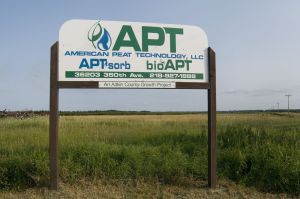 American Peat Technology was incorporated in 2003 with a single focus: to produce granular microbial carriers for the agronomy industry. The concept of adding beneficial microbes to the soil in order to increase crop yields is not a new concept. In 1896,
American Peat Technology was incorporated in 2003 with a single focus: to produce granular microbial carriers for the agronomy industry. The concept of adding beneficial microbes to the soil in order to increase crop yields is not a new concept. In 1896,
Nobbe and Hiltner applied for a patent to protect their invention: glass tubes of agar-gelatin that contained pure colonies of plant growth promoting bacteria, which would subsequently be mixed with water and then introduced onto legume seeds prior to planting. Although it is an effective way to introduce beneficial microbes, liquid inoculation can result in high bacterial mortality for a number of reasons. First, the liquid coating is prone to drying, and if the seeds are planted into desiccating conditions, the bacteria can die off before germination happens. Second, liquids don’t offer any sort of refuge for the introduced bacteria, and they can be overcome by the native microbes in the soil before they have an effect on the germinating seed.
Today, reed-sedge peat is the solid carrier of choice for Rhizobia bacteria. Peat is hydrophilic and resists drying, and because of the processing method, it is nearly sterile. As a result, peat-Rhizobia formulations are the industry standard for many types of legumes. One of the major drawbacks of peat, however, is the inconsistent nature of the product. Peats can vary widely in decomposition, pH, plant source and ash content. From its inception, American Peat Technology has had exclusive rights to a high-quality peat reserve that results in excellent microbial survivability. That raw material, along with APT’s commitment to quality, is the cornerstone of APT’s success.
Shortly after shipping off the first load of bioAPT microbial carriers, APT realized the need to diversify and to continue to search for new markets for peat-based products. Toward that end, APT has developed a line of products for water treatment. APTsorb water remediation media harnesses the natural affinity of organic soils for heavy metals, and transforms it into a granular form that has excellent hydraulic conductivity. In addition, APT is playing a key role in unlocking the mystery of peat chemistry, and is exploring ways to use the active peat surface to create solutions for other environmental concerns such as sulfate and mercury.
Peat is a largely-untapped resource, and APT is at the forefront in the effort to develop valuable products using this unique material. Our commitment to stewarding the resource and finding the best uses for peat sets APT apart from other companies. The story of innovative peat-based products is just beginning, and APT will continue to play a pivotal role for many years to come.
